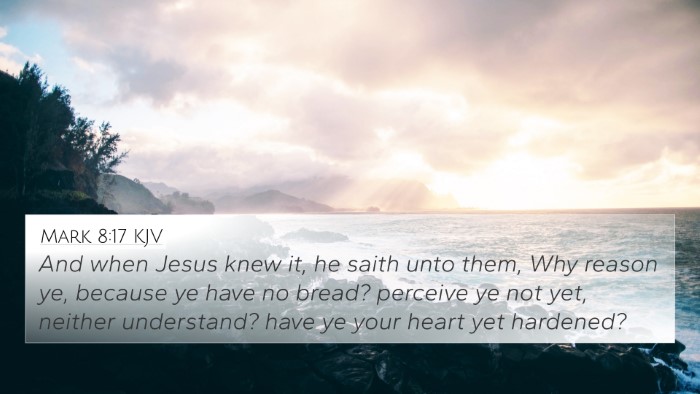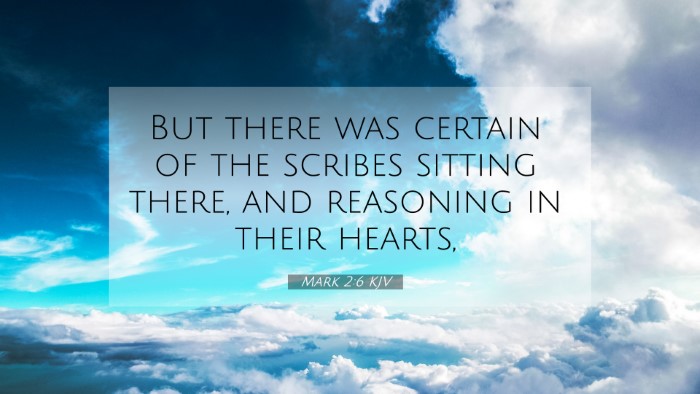Old Testament
Genesis Exodus Leviticus Numbers Deuteronomy Joshua Judges Ruth 1 Samuel 2 Samuel 1 Kings 2 Kings 1 Chronicles 2 Chronicles Ezra Nehemiah Esther Job Psalms Proverbs Ecclesiastes Song of Solomon Isaiah Jeremiah Lamentations Ezekiel Daniel Hosea Joel Amos Obadiah Jonah Micah Nahum Habakkuk Zephaniah Haggai Zechariah MalachiMark 2:6 Similar Verses
Mark 2:6 Cross References
But there was certain of the scribes sitting there, and reasoning in their hearts,
Uncover the Rich Themes and Topics of This Bible Verse
Listed below are the Bible themes associated with Mark 2:6. We invite you to explore each theme to gain deeper insights into the Scriptures.
Mark 2:6 Cross Reference Verses
This section features a detailed cross-reference designed to enrich your understanding of the Scriptures. Below, you will find carefully selected verses that echo the themes and teachings related to Mark 2:6 KJV. Click on any image to explore detailed analyses of related Bible verses and uncover deeper theological insights.

Luke 5:21 (KJV) »
And the scribes and the Pharisees began to reason, saying, Who is this which speaketh blasphemies? Who can forgive sins, but God alone?

Mark 8:17 (KJV) »
And when Jesus knew it, he saith unto them, Why reason ye, because ye have no bread? perceive ye not yet, neither understand? have ye your heart yet hardened?

Matthew 16:7 (KJV) »
And they reasoned among themselves, saying, It is because we have taken no bread.

2 Corinthians 10:5 (KJV) »
Casting down imaginations, and every high thing that exalteth itself against the knowledge of God, and bringing into captivity every thought to the obedience of Christ;
Mark 2:6 Verse Analysis and Similar Verses
Summary and Meaning of Mark 2:6
In Mark 2:6, we see Jesus encountering opposition from the scribes who are questioning His authority to forgive sins. This verse captures the tension between Jesus' divine authority and the religious leaders' skepticism.
Contextual Background
The chapter begins with the healing of a paralytic, showcasing Jesus' authority to heal both physically and spiritually. The scribes, who represent the established religious order, challenge the very essence of Jesus' mission by doubting His power to forgive sins.
Insights from Commentaries
-
Matthew Henry:
Henry emphasizes the significance of Christ’s authority being questioned. He notes that the scribes symbolize a lack of understanding of Jesus' divine nature, and their skepticism is met with Christ's direct assertion of His power to forgive sins.
-
Albert Barnes:
Barnes points out that the scribes were not merely questioning, but were internally accusing Jesus of blasphemy. He highlights that their knowledge of the law made them particularly resistant to acknowledging Jesus' divine capabilities.
-
Adam Clarke:
Clarke expands on the implications of this verse, marking the theological significance of forgiveness in the ministry of Jesus. He explains that the act of forgiving sins was reserved for God alone, thus showcasing Jesus’ claim to divinity.
Thematic Connections
Mark 2:6 invites a closer examination of the connections between the themes of authority, forgiveness, and divine identity throughout the Scripture. This can be further explored through cross-referencing relevant Bible verses.
- Isaiah 43:25: God declares He blots out transgressions.
- Psalms 103:3: “Who forgiveth all thine iniquities.”
- Matthew 9:6: Jesus demonstrates authority to forgive sins before healing the paralytic.
- Luke 5:21: Scribes question Jesus’ ability to forgive sins in a similar narrative.
- John 10:33: Religious leaders accuse Jesus of blasphemy for claiming to be God.
- Acts 5:31: Jesus, raised by God, is the one who gives repentance and forgiveness.
- Colossians 3:13: Encourages believers to forgive as the Lord forgave them.
Comparative Bible Verse Analysis
The understanding of Mark 2:6 is enriched by examining similar passages and drawing connections between Bible verses. This verse is crucial in revealing the identity of Christ and His mission on Earth. The interplay between faith, healing, and forgiveness is notably important.
Cross-Referencing Biblical Texts
Tools for Bible cross-referencing can assist in deepening one’s study. Identifying connections between the Old and New Testaments highlights the continuity of God's message. For instance, the connection between the Old Testament prophecies of healing and the New Testament fulfillments in Jesus’ ministry.
Conclusion
Mark 2:6 places the reader at a significant junction, illuminating the skepticism towards Jesus' divine authority while simultaneously confirming His identity as the Son of God. The thematic ties to forgiveness and authority raise profound questions about faith and recognition of divine revelation, making cross-referencing an invaluable practice in Biblical studies.


